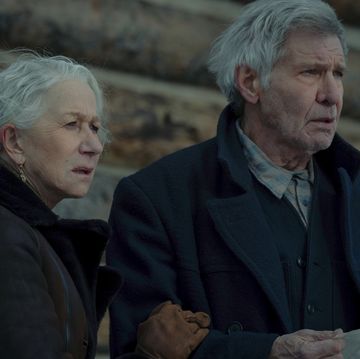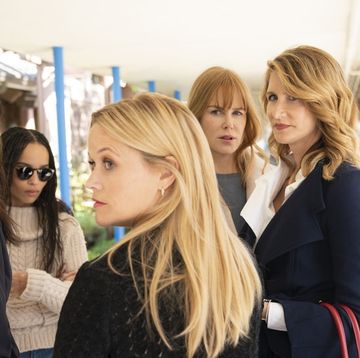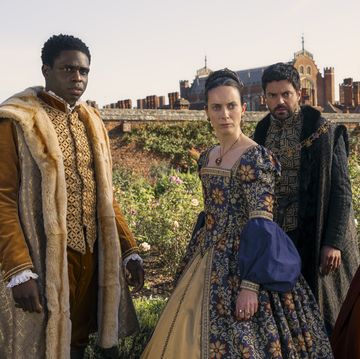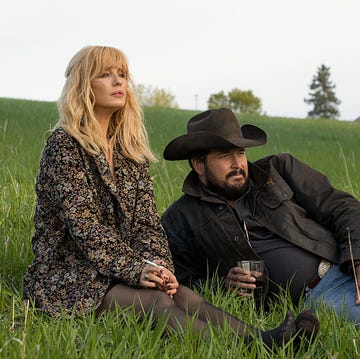This year was a tumultuous one, to say the least, with conflict breaking out in the Middle East, war continuing in Ukraine, multiple indictments of a former president, and the death of a former first lady. Throughout it all, Americans tuned into a woman who has been a cornerstone of broadcast journalism for nearly half a century: Andrea Mitchell.
Mitchell—who is now NBC News Chief Foreign Affairs Correspondent, Chief Washington Correspondent, and host of MSNBC's Andrea Mitchell Reports—celebrated 45 years at NBC this year, and 15 years as an anchor on MSNBC. Today, Mitchell's colleagues—including Lester Holt, Kristen Welker, Savannah Guthrie, Jen Psaki, Peter Alexander, and Vaughn Hillyard—surprised her during her MSNBC show to congratulate her on the achievement.
She has no plans to slow down anytime soon—and her contract with NBC was just renewed. "I’ve been blessed to have a long, productive career with NBC News, and the terrific thing about journalism is experience is valued," she tells Town & Country over e-mail. "As long as I find this work fulfilling, and fun and challenging, I’ll continue doing it." She's covered every presidential campaign since 1980, and is gearing up for another one next year. Here, Mitchell reflects back on her storied tenure, her best days and her worst days, and what's next for her.
When you look back on your time at NBC, what stands out as a highlight?
I think of all the historic moments I’ve covered and hundreds of places I’ve been—from covering President Ronald Reagan’s summits with former Soviet leader Mikhail Gorbachev, to traveling to North Korea and Iran. But even more important are the extraordinary journalists who have taught me so much throughout my career. Mentors like Tom Brokaw and Tim Russert, as well as amazing women like Libby Leist, who started as my researcher and is now the Executive Vice President in charge of TODAY and Lifestyle Programming, and Michelle Perry, whose worked with me for fifteen years and is now the Executive Producer of Andrea Mitchell Reports on MSNBC. Their influence really defines my career at NBC News.
What was your toughest day on the job?
Without question, my toughest day on the job was 9/11, the worst attack on the American homeland since Pearl Harbor. We responded instantaneously by calling intelligence sources and being part of what became non-stop broadcasting on all of our platforms for round the clock coverage for five days straight, without even a commercial break. Many of us had friends and family in New York or at the Pentagon and were also worried about their safety. We all knew our lives, and the country, would never be the same.
What was your proudest moment?
My proudest moments have been going to remote places around the world and shedding light on terrible situations that often don’t receive enough attention.
An example is traveling to Sudan in 2005 during the Darfur genocide with then-Secretary of State Condoleezza Rice and most recently to neighboring Chad with UN Ambassador Linda Thomas Greenfield, where hundreds of thousands of refugees are again escaping from another violent civil war in Sudan. Those are challenging trips but give me a sense of purpose, of knowing we are informing the wider world of mass killings and human rights issues that would otherwise be forgotten.
What is the most revealing interview you've ever done?
[I interviewed] President Donald Trump’s head of national intelligence, Dan Coats, a few days after the President’s widely criticized summit with Russian President Vladimir Putin in Helsinki. In the middle of our live and televised interview, my producer passed me a note that the President had inexplicably invited Putin to visit him at the White House. I immediately broke the news to the country’s head of intelligence, who was so shocked he laughed—an honest reaction that revealed a public rift with the President in real time. It aired on every network in real time and was a defining moment that had real consequences, affecting the duration of their relationship.
Is there a time you were caught off guard in an interview? How did you handle it?
I was certainly caught off guard when asking questions of three dictators at different times.
In 1993, while covering former President Bill Clinton’s meeting with former Syrian President Hafez al Assad in Damascus, I asked Assad why he was supporting terrorism. Before he could complete his answer, his strongmen literally picked me up under the arms and carried me out of the room. President Clinton doubled over laughing, later telling me jokingly that he finally found a way to get me to stop asking questions.
Years later in Sudan, while traveling with then-Secretary of State Condoleezza Rice, I asked a similar question of former Sudanese President Omar al Bashir during a photo opportunity and got dragged more forcefully out of the room. Secretary Rice demanded an apology from the Foreign Minister before leaving the country.
The worst time was in Tehran in 2009, after interviewing Iran’s President Mahmoud Ahmadinejad in the Presidential Palace. Of course, I had to ask about Iran’s support for terrorism. His aides then demanded to take our videotapes. It took us a few hours to get out with our video and be able to broadcast the interview on NBC Nightly News that night.
What do you view as the biggest change you've seen in the broadcast industry?
The biggest change I’ve seen over the decades is the inclusion of so many women and minorities in large numbers, and at all levels in our industry. Women are now in key jobs on and behind the cameras and in the executive offices. It has made a huge difference in the kinds of stories we cover and the way they are reported. Showcasing accomplished women and minorities in high-profile and leadership positions also creates role models for young people of diverse backgrounds who want to become journalists.
The other enormous change, of course, is technological, transforming the way we communicate from cell phones to digital platforms and expanding our reach to remote communities in the U.S. and distant countries by satellite uplinks.
You've been a trailblazer for women in news. What advice do you give to young women starting out in the industry?
My advice to younger women starting out in the industry is to study hard and do your homework. Always listen closely to the answers of people whom you’re interviewing rather than thinking of your next question. Often the most interesting news comes in response to a follow up question to an unexpectedly revealing comment.
What are you looking forward to in 2024?
Having covered every presidential campaign since 1980, in 2024 I look forward to bringing my experience and contacts to our team’s political coverage of the campaigns, conventions and debates, as well as reporting stories that provide more context on major issues. I also look forward to talking not only to the candidates, but to the voters. I want to better understand what is driving people to make the choices they make at the polls. And I want to continue shedding light on humanitarian crises and issues around the globe.
Emily Burack (she/her) is the Senior News Editor for Town & Country, where she covers entertainment, culture, the royals, and a range of other subjects. Before joining T&C, she was the deputy managing editor at Hey Alma, a Jewish culture site. Follow her @emburack on Twitter and Instagram.















